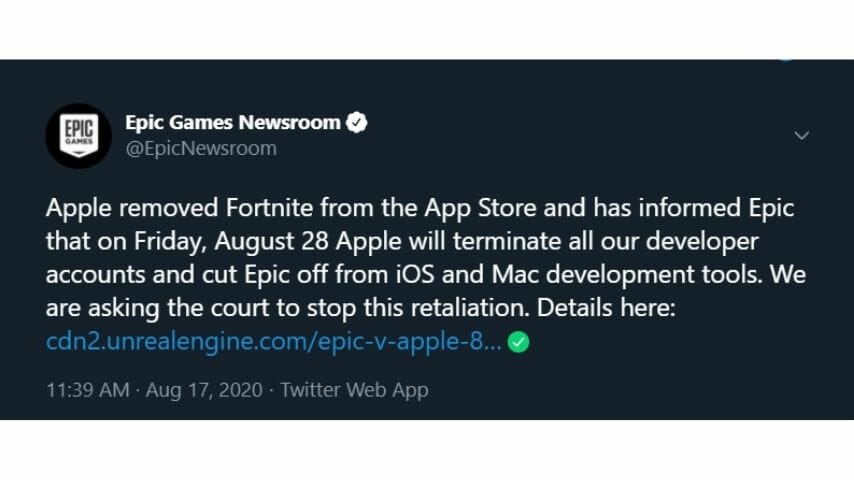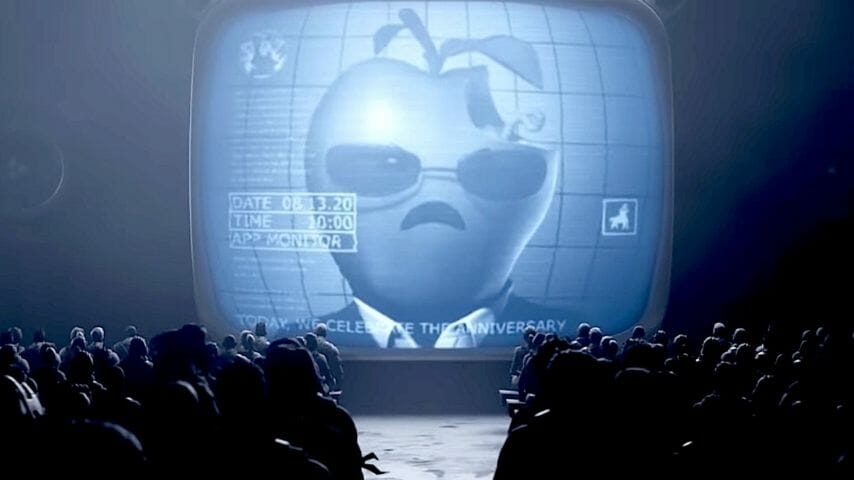“Epic’s lawsuit is nothing more than a basic disagreement over money. Although Epic portrays itself as a modern corporate Robin Hood, in reality it is a multi-billion dollar enterprise that simply wants to pay nothing for the tremendous value it derives from the App Store.”
There are the opening words of Apple’s countersuit filed against Epic Games in U.S. District Court Northern District of California yesterday, and the latest blow in an ongoing legal battle between the two corporate behemoths.
It all started back on Aug. 13, when Epic Games unveiled the Fortnite Mega Drop—a structural shakeup in the purchase of Fortnite’s in-game currency, V-bucks. The new plan not only allowed, but encouraged players to bypass both the Apple App and Google Play stores—both of which receive 30% of profits from games downloaded on their respective stores—offering 20% savings for players who purchased V-bucks directly from the Epic Game Store. In retaliation, Apple dropped Fortnite from the App store, stating Epic had violated Apple’s terms of service.
A mere two hours later, Epic Games hosted an in-game event where they premiered “Nineteen Eighty-Fortnite”, a short video both spoofing and critiquing Apple’s own 1984 themed commercial that aired back in 1984. Epic then proceeded to file a complaint against Apple in U.S. District Court Northern District of California, citing Apple’s “use of a series of anti-competitive restraints and monopolistic practices” as the heart of the case, and the reason why Epic felt they needed to take a stand against “the behemoth seeking to control markets, block competition, and stifle innovation.” Not long after #FreeFortnite began trending on Twitter, Google announced it would also be dropping the game from the Google Play store, stating that Epic’s move violated their terms of service as well.

A few days later, the Epic Games Newsroom twitter announced Apple was set to terminate Epic’s developer access on Aug. 28. Epic then filled yet another complaint against Apple, stating “the damage to Epic’s ongoing business and to its reputation and trust with its customers will be unquantifiable and irreparable” if Apple were permitted to revoke their licenses. Microsoft was quick to come to the defense of Epic, writing a statement that claimed “denying Epic access to Apple’s SDK … will place Unreal Engine and those game creators that have built, are building, and may build games on it at a substantial disadvantage.”
On Aug. 25, the issue was taken to court, where Judge Yvonne Gonzalez Rogers ruled Apple could not block Epic’s developer access, but was also under no obligation to feature Fortnite on the App Store, resulting in an uneasy draw between the two corporations. That is until today.
In Apple’s countersuit, the company states “Epic has taken advantage of Apple’s support and services more than any other app developer for the past two years,” and has made over half a billion dollars thanks to the games presence on the App Store. They also argued this battle is not a moral one for Epic, but one purely driven by their own corporate greed and desire for special treatment. As of right now, Epic has only responded with a tweet urging Epic Games account users to transition their account info away from “Sign In with Apple,” as the option will be unavailable starting Sept. 11. Here’s hoping we get another short film here soon.

